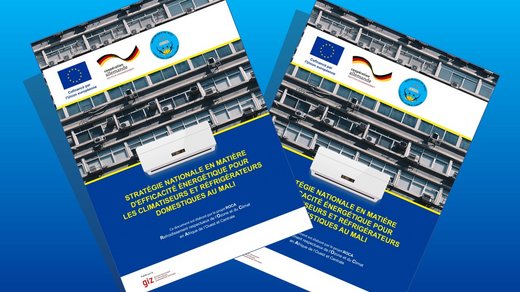Publications & Videos
Results 1 to 10 of 132

05/2024 Publication - Technical PublicationGreen Refrigeration and Air Conditioning in the Hotel Sector
This publication informs the hotel industry about environmentally, climate and ozone friendly technologies for Refrigeration and Air Conditioning (RAC) devices. Most of the green alternatives presented here are already available in several countries. By “green” technology, it is referred to devices or appliances that have zero impact on the ozone layer, ultra-low or zero Global Warming Potential (GWP below 10) and are also highly energy efficient.

05/2024 Publication - Technical PublicationNational Energy Efficiency report for ACs and refrigerators in Burkina Faso
A more efficient use of energy would lead to less CO2 emissions and thereby reduce global warming. Minimum Energy Performance Standards (MEPS) and energy efficiency labels are a low cost strategy to follow this aim and to increase the number of energy efficient tools on the market. The ROCA project is working on this in its partner countires. This publication presents some results and recommendations for Burkina Faso.

12/2023 PublicationCOP 28 RAC Skills Side Event Highlights Philippine Innovation in Green Jobs through Climate-Friendly Cooling
The Philippines highlighted its best practice on green jobs in climate-friendly cooling through the COP 28 hybrid side event “Skills in Refrigeration and Air Conditioning with Growth in Global Cooling Demand” at the Philippine Pavilion on 08 December 2023.
12/2023 PublicationCOP28: Greener Reefers – introducing climate and environmentally friendly maritime cooling containers
Around 3 million reefer containers are currently shipped around the world, and the number is growing annually. Reefer containers are vital for trading chilled and frozen products globally. On their journey however, reefer containers contribute notably to the emissions released by the container shipping industry (236 million tCO2eq. in 2018) and the reefer sector is projected to grow rapidly up to +8% p.a..
12/2023 PublicationCOP28: Avoiding 0.1 degrees Celsius with "Green" Split Air
10 new Air Conditioners (ACs) are being sold every second for the next 30 years. If not addressed, energy demand from ACs will more than triple by 2050, equal to China’s electricity demand today (IEA 2018). Split ACs represent the largest growing sub-sector. At the same time, they are responsible for the largest share of energy, of HCFC and HFC consumption and therefore of CO2-eq emissions.
12/2023 PublicationCOP28: Agrifood Cold Chains: Reducing food losses, waste and methane emissions
Every year, an estimated 14 percent of total food produced is lost in the field, and 17 percent is wasted at the point of retail or consumption. This is enough food to feed approximately 1 billion hungry people around the world. At the same time, the rotting groceries lead to considerable amounts of methane emissions.
One major solution to food loss and waste is increasing access to refrigeration, ensuring that food is kept at suitable temperature conditions from harvest to plate. The experts will highlight the use of sustainable cold chains in the Global South with natural refrigerants, combining energy efficiency and renewable energy sources.
12/2023 PublicationCOP28: Cool NDCs: Integrating the Refrigeration and Air Conditioning Sector into NDCs
The refrigeration and air conditioning sector is responsible for up to 10% of all global emissions – and it is growing rapidly. The transition to Green Cooling technologies can decrease these emissions significantly. Consequently, it is pivotal to develop cooling sector specific mitigation targets and measures that are integrated in the Nationally Determined Contributions (NDC).
12/2023 PublicationCOP28: The Climate and Ozone Protection Alliance- Management of Banks of Ozone Depleting Substances and Hydrofluorocarbon Banks
The global demand for refrigeration and air conditioning is increasing, leading to an increase in environmentally-friendly appliances and products containing high warming potential substances. These substances, known as Ozon Depleting Substances (ODS) and Hydrofluorocarbons (HFCs), emit around 1.5 Gt CO2 annually. The Climate and Ozone Protection Alliance (COPA) aims to address this issue by working together on solutions for ODS and HFC banks, contributing to the Paris Agreement's goal of limiting global warming.
12/2023 PublicationCOP28 The Importance of Green Cooling: Fighting the Climate Crisis
The refrigeration and air conditioning sector is responsible for up to 10% of all global emissions. This is due to its huge energy consumption and the high global warming potential of many common refrigerants. At the same time the demand for cooling is rising steadily. The good news: the emissions can be reduced significantly by using Green Cooling technologies. Green Cooling is based on natural refrigerants and energy efficiency.
This side event not only showed the significance of the cooling sector for mitigation and adaptation but also presented the available Green Cooling technologies.
09/2023 Publication - Technical PublicationNational Energy Efficiency Strategy for ACs and refrigerators in Mali
The demand for energy could be significantly reduced by improving energy efficiency. This would have a double effect: lower costs for consumers, and lower CO2 emissions. This report recommends steps Mali could take towards more energy efficiency.
